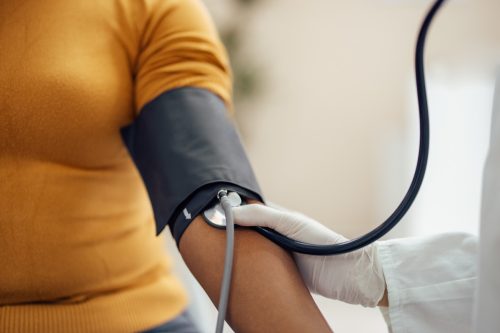8 Ways Women Can Slash Their Heart Disease Risk, FDA Says in New Update
The agency is advising women on steps they should take for their heart health.

Do you know the leading cause of death for women? According to the Centers for Disease Control and Prevention (CDC), it's heart disease. The agency's latest data shows that across all races and ages, 21.8 percent of women died from this health concern in 2018. And in a recent consumer update, the U.S. Food and Drug Administration (FDA) said that this fact is not as well-known as it should be.
"Many women do not realize that they are at risk for heart disease," Kaveeta Vasisht, the FDA's associate commissioner for women's health, said in a statement. "Understanding that women may have unique risk factors and can present with non-typical symptoms is critical to fighting heart disease in women."
According to the FDA, the risk of heart disease for women goes up after they reach menopause. But it's still possible to develop when you're younger, too, so it's important to know how small changes can help protect your heart health at any age. With that in mind, the agency is providing new tips to aid women in combatting this leading cause of death. Read on for eight ways women can slash their heart disease risk, according to the FDA.
RELATED: 8 Daily Habits That Keep Your Heart Young.
1
Know your risk factors.

Being aware of your chances of developing heart disease is the first step to being able to prevent it. According to the FDA, nine out of 10 women have at least one risk factor for heart disease. These include high blood pressure, high cholesterol, diabetes, smoking, and a family history of premature heart disease.
"With the exception of family history, you can modify the other risk factors to reduce your risk of heart disease," the agency explained.
RELATED: 7 Biggest Health Risks of Sitting All Day, Doctors Say.
2
Manage current health conditions.

If you do have diabetes, high blood pressure, or high cholesterol, the next step would be to make sure you're managing your health conditions to lower your risk of developing heart disease later on.
"Talk to your health care provider to confirm the best treatment plan," the FDA advised.
3
Recognize heart attack symptoms in women.

It's easy to assume you would know if you were having a heart attack. But while the most common symptom of a heart attack is chest discomfort, you can actually have one without feeling any pain or pressure in the area. Beyond that, "women are more likely than men to have other symptoms," according to the FDA.
The symptoms of a heart attack in women may include an ache or feeling of tightness in the chest, arm, neck, jaw, back, or abdomen; shortness of breath; nausea or vomiting; lightheadedness; extreme fatigue; and breaking out in a cold sweat.
"If you have these symptoms and suspect you're having a heart attack, call 911," the agency said. "Call even if you're not sure, it could save your life."
4
Engage in regular physical activity.

Obesity can lead to developing risk factors like high blood pressure, high cholesterol, and pre-diabetes—which in turn, increase your risk of heart disease. That's why the FDA said it is important for women to engage in regular physical activity and maintain a healthy weight.
"You don't need to complete all activity at one set time, and it's okay if you're not a fan of the gym," the agency noted. "Walking may be one easy way to start. Talk to your health care provider about how much activity is right for you."
RELATED: Walking for Just 11 Minutes a Day Can Help You Live Longer, New Research Shows.
5
Make heart-healthy food choices.

Your diet can determine your risk as well. So focus on making more heart-healthy foods choices: "Eat fruits and vegetables with each meal; limit saturated fat and added sugars; and eat more whole grains," according to the FDA.
When it comes to meat, the agency said you should also choose the leanest cuts available and prepare them with a health-conscious perspective.
"You can check with your health care provider to confirm the food choices best for you," the FDA suggested.
RELATED: The Easy and Effective Diet Tweak That Helps You Live Longer.
6
Don't start taking aspirin without talking to your doctor.

Over the years, many older adults have picked up the habit of a taking aspirin every day as a way to prevent a possible heart attack or stroke. But recently, the health guidance around this idea has shifted.
"Daily use of aspirin is not right for everyone," the FDA warned in its update.
According to the agency, aspirin has been shown to be helpful in lowering the risk of heart attack and clot-related strokes in patients who have heart disease, or who have had a prior heart attack or stroke. But if you don't have heart disease, the risks of long-term aspirin use—which include stomach bleeding, brain bleeding, and kidney failure—might outweigh the benefits.
"Talk with a health care provider before you use aspirin to prevent heart attacks," the FDA advised.
7
Quit smoking.

Putting down the cigarettes can also help you slash your heart disease risk. "If you smoke, try to quit," the FDA said in its update.
Smoking cigarettes can harm your cardiovascular system, according to the agency.
"When you breathe, your lungs take in oxygen and deliver it to your heart, which pumps this oxygen-rich blood to the rest of your body through the blood vessels," the FDA explains on its website. "But when you breathe in cigarette smoke, the blood that is distributed to the rest of the body becomes contaminated with the smoke's chemicals."
These chemicals can cause damage to your heart and blood vessels, which can cause you to develop heart disease.
8
Consider participating in clinical trials.

The FDA also advised women to work with their health care provider to make a plan for their heart health. For some, this could include participating in a clinical trial.
"You can make a difference by helping doctors learn more about women's health," the agency explains on its website.
But that might not be the right way for some women to reduce their heart disease risk.
"Talk to a health care provider about whether you can participate in a clinical trial for a heart medication or procedure," the FDA recommended in its recent update.
For more health advice delivered straight to your inbox, sign up for our daily newsletter.
Best Life offers the most up-to-date information from top experts, new research, and health agencies, but our content is not meant to be a substitute for professional guidance. When it comes to the medication you're taking or any other health questions you have, always consult your healthcare provider directly.





















